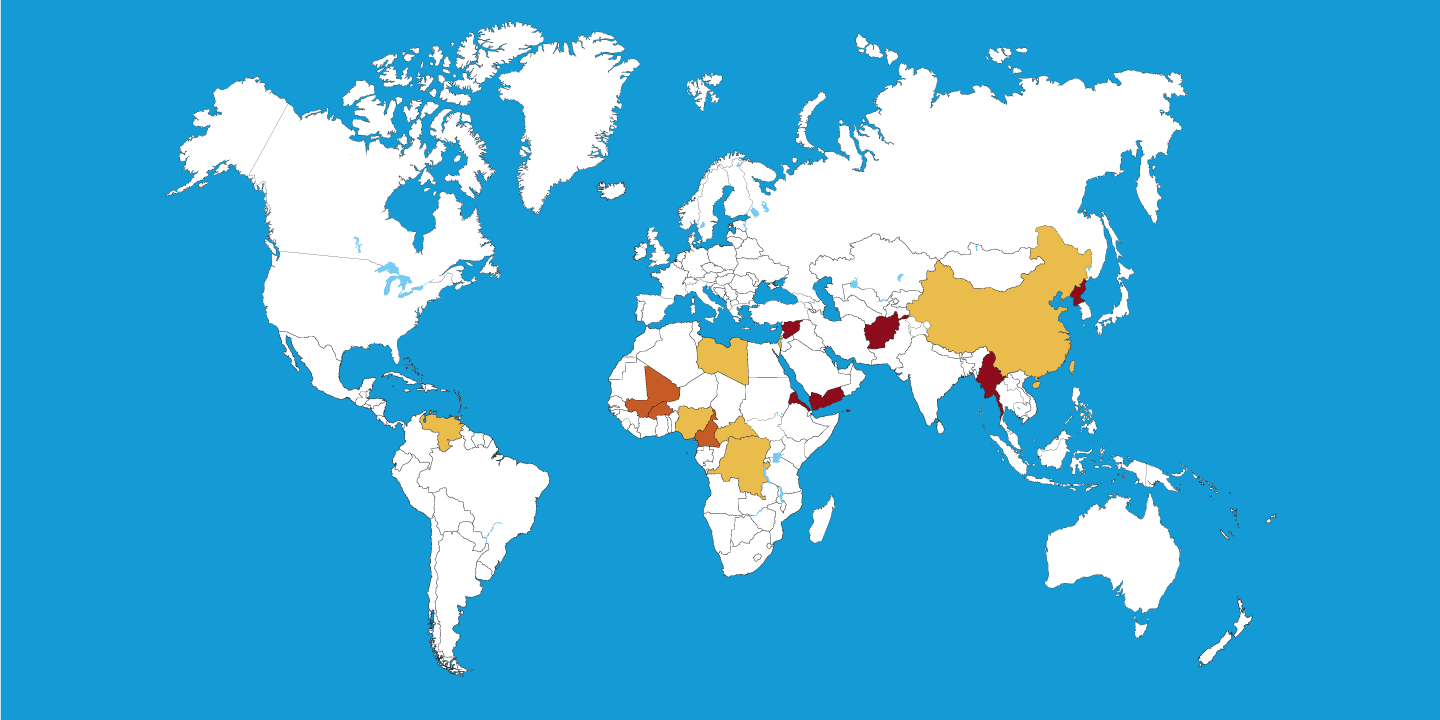

R2P Monitor, Issue 47, 15 September 2019
R2P Monitor is a bimonthly bulletin applying the atrocity prevention lens to populations at risk of mass atrocities around the world. Issue 47 looks at developments in Afghanistan, Myanmar (Burma), Syria, Yemen, Cameroon, Mali and Burkina Faso, Burundi, Central African Republic, China, Democratic Republic of the Congo, Libya, Nigeria and Venezuela.
Highlights include:
Current Crisis
Afghanistan
The UN documented increased civilian casualties in Afghanistan during 2018, largely attributed to the use of improvised explosive devices by the Taliban and other anti-government armed groups. Since December 2018 a United States government delegation has participated in talks with the Taliban in an effort to end the war. Despite their participation in the talks, since July the Taliban has carried out a number of suicide attacks and car bombings. Although the US announced a potential final agreement during August, suspected Taliban attacks that killed nearly 100 civilians prompted US President Donald Trump to call off any further negotiations.
Myanmar (Burma)
Since November 2018 conflict has flared in Rakhine State between Myanmar’s military and the Arakan Army (AA), an armed group seeking greater autonomy for the ethnic Rakhine Buddhist population. Myanmar’s security forces have shelled villages, blocked food supplies and arbitrarily detained civilians. Many of the military units fighting the AA have been implicated in crimes against humanity, war crimes and genocide perpetrated against the Rohingya in Rakhine State.
Syria
Since the Syrian crisis began in 2011 the conflict between the government and opposition groups has escalated into a civil war in which at least 560,000 people have been killed. The escalation of fighting in Idlib and adjoining portions of Aleppo and Hama governorates – the last remaining opposition strongholds within Syria – puts populations at ongoing risk of mass atrocity crimes. The Office of the UN High Commissioner for Human Rights (OHCHR) has confirmed 1,089 civilian deaths, including over 300 children, since the launch of the offensive – 1,081 of which are allegedly attributable to Syrian government and Russian forces.
Yemen
Despite diplomatic efforts to end Yemen’s four-year war, populations remain at risk of war crimes and are experiencing the largest humanitarian crisis in the world. Despite the December 2018 “Stockholm Agreement” and the ceasefire in Hodeidah largely holding, hostilities have intensified elsewhere, however, particularly in Al-Dhale, Hajjah, and Taiz governorates, as well as Aden.
Imminent Risk
Cameroon
Populations in Cameroon are at imminent risk of potential atrocity crimes due to the ongoing crisis in the Anglophone regions and military operations against the armed extremist group, Boko Haram. According to OCHA, eight out of ten regions in Cameroon are currently affected by political violence.
Mali and Burkina Faso
Since 2015 Islamist armed groups have expanded their activities from northern to central Mali, prompting the formation of ethnic militias and armed “self-defense groups” in many communities. A cycle of reprisal attacks in the Mopti region of central Mali has dramatically increased since January, with more than 600 people killed. The porous border between Mali and neighboring Burkina Faso has facilitated the expanded activities of Islamist armed groups throughout the region.
Serious Concern
Burundi
In a report released on 4 September, the Human Rights Council-mandated Commission of Inquiry on Burundi found that ongoing violence against alleged government opponents constitute systematic attacks that have created an environment conducive to the commission of atrocities. According to the CoI, elections scheduled for 2020 could trigger further violations and abuses that may amount to crimes against humanity. The CoI has found evidence of recent extrajudicial killings and summary executions, enforced disappearances, sexual violence, arbitrary detention and torture of suspected dissidents. Such acts have primarily been carried out by the Imbonerakure, the youth wing of the ruling Conseil national pour la défense de la démocratie-Forces pour la défense de la démocratie (CNDD-FDD), together with members of the National Intelligence Service and police.
Central African Republic
Despite the signing of a peace deal during February, ongoing fighting amongst armed groups in CAR leaves civilian populations at risk of attack.
China
Approximately one million Uighurs and other Turkic Muslim minorities are currently being detained in “re-education” or “de-extremification” facilities in China without formal charges, due process, or access to legal representation. Systematic discrimination against the Uighurs, as well as surveillance systems that target the group, increases their vulnerability to violations and abuses of their fundamental human rights.
Democratic Republic of the Congo
Several provinces in eastern DRC – notably North Kivu, South Kivu, Ituri and Tanganyika – have been plagued by recent inter- communal violence and attacks by armed groups. Meanwhile, widespread displacement from Ituri and North Kivu contributes to an already precarious security and humanitarian situation as the international community attempts to confront cholera, measles and Ebola outbreaks that have claimed the lives of thousands of people.
Libya
On 4 April Field Marshal Khalifa Haftar ordered his self-proclaimed Libyan National Army to launch an offensive against the UN-backed Government of National Accord based in Tripoli. At least 100 civilians have been killed and over 100,000 displaced since April. Additional fighting broke out in Murzuq, resulting in at least 45 civilians killed and thousands displaced.
Nigeria
Recurring inter-communal violence in the “Middle Belt” region and ongoing attacks by Boko Haram continue to threaten populations in Nigeria.
Venezuela
Since President Nicolas Maduro took office during 2013, popular discontent with the government has led to widespread protests. The government has routinely responded to mass protests with disproportionate and deadly force as well as the mobilization of auxiliary militias, so-called “colectivos.” The Venezuelan government has reported that 6,856 people have been killed in “security operations” since January 2018.
Related Publications


Atrocity Alert No. 402: Ukraine, Myanmar (Burma) and Nigeria
